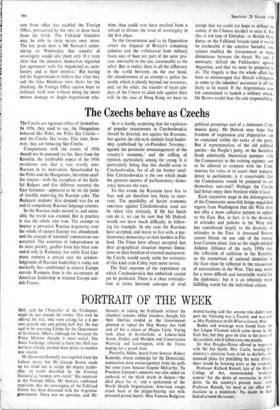The Czechs behave as Czechs
The Czechs are rigorous critics of themselves. In 1956, they used to say, the Hungarians behaved like Poles, the Poles like Czechs— and the Czechs like swine. This time, how- ever, they are behaving like Czechs.
Comparisons with the events of 1956 should not be pursued too far. Seen from the Kremlin, the intolerable aspect of the 1956 revolution was that it was overtly anti- Russian in its motivation. Spearheaded by the Poles and the Hungarians, the entire satel- lite empire—with the exception of the faith- ful Bulgars and (for different reasons) the East Germans—appeared to be on the point of forcibly removing the Russian yoke. The Budapest students' first demand was for an end to compulsory Russian language courses.
So the Russian tanks moved in, and osten- sibly the revolt was crushed. But in practice it was the rebels who won. The attempt to impose a pervasive Russian hegemony over the whole of eastern Europe was abandoned, and the concept of 'national' communism was accepted. The assertion of independence in its most prickly, gaullist form has been con- ceded only in Rumania; but while East Ger- many remains a special case the acknow- ledgement of Russian leadership is today not markedly less conditional in eastern Europe outside Rumania than is the acceptance of American leadership in western Europe out- side France. So it is hardly surprising that the explosion of popular resentments in Czechoslovakia should be directed, not against the Russians, but against the old-style stalinist local leader- ship symbolised by ex-President Novotny : against the persistent mismanagement of the country's economy,' and the stifling of opinion, particularly among the young. It is particularly fitting that this should occur in Czechoslovakia, for of all the former satel- lites Czechoslovakia is the one which made the greatest success of parliamentary demo- cracy between the wars.
To this extent the Russians have less to fear, and are therefore less likely to inter- vene. The possibility of Soviet economic sanctions against Czechoslovakia need not be taken very seriously. If Mr Ian Smith can do it, we can be sure that Mr Dubcek would not have much difficulty in follow- ing his example. In any case the Russians have accepted, and learnt to live with, a par- liamentary democracy on their borders in Fin- land. The Finns have always accepted that their geographical situation imposes limita- tions on their freedom of external manoeuvre; the Czechs would surely settle for restraints of this kind even if they were more severe.
The final outcome of the experiment on which Czechoslovakia has embarked cannot yet be predicted. There is a clear contradic- tion in terms between concepts of rival political groupings and of a dominant Com- munist party. Mr Dubcek may hope that freedom of expression and disputation can be contained within the ranks of the party. But if representatives of the old political parties—the People's party, or the Socialists (both admittedly theoretical partners with the Communists in the existing regime)—are to be allowed to compete with the Com- munists for votes or to assert their indepen- dence in parliament, is it conceivable that the Communists would be prepared to see themselves outvoted? Perhaps the Czechs had better enjoy their freedom while it lasts.
Each successive stage in the disintegration of the Communist monolith brings anguished regrets from Washington that the West does not offer a more cohesive pattern to appeal to the East. But, in fact, it is the diversity of attitudes and policies in the West that has contributed largely to the diversity of attitudes in the East. A thousand flowers cannot bloom on one side of the former Iron Curtain alone. Just as the single-minded Atlantic Alliance of the early 1950s was the reflection of stalinism in the Kremlin, so the reassertion of national identities in the East must be reflected in the reassertion of nationalisms in the West. This may make for ,a more difficult and intractable world for the diplomats: but it is an infinitely more fulfilling world for the individual citizen.






































 Previous page
Previous page